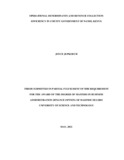| dc.description.abstract | The purpose of revenue collection is to lessen inequalities in the distribution of income and wealth, in modern economics taxes are the most important sources of revenue. Since the introduction of devolved system of Government counties have witness increased cases of financial deficit in their budget. The main objective of this study was to establish the operational determinants of revenue collection efficiency in County Government of Nandi. The specific objectives were as follows: to assess the effect of competence, determine the effect of revenue automation, and establish the effect of internal control and to establish the effect of level of awareness on the efficiency of revenue collection of County Government of Nandi government. The study was guided by the new public management theory. The study adopted a descriptive survey research design. The study was carried out in County Government of Nandi. The targeted population was 183 respondents comprising of management and directors of revenue staff, revenue collecting and reporting staff as well as small and medium enterprises’ owners in Kapsabet Town Central Business District. The study used stratified random sampling to select 126 respondents. The study adopted descriptive and inferential statistical analyses and explanatory design, it utilized both qualitative and quantitative research method. A self-administered questionnaire was administered to collect information from the respondent. Reliability and Validity of the data collection instrument was tested using Cronbach alpha and Average Variance Extracted (AVE) respectively. Descriptive and inferential statistical analyses was carried out on the quantitative data using the Pearsons correlation coefficient which was used to determine the relationship between the independent variables and the dependent variables, while regression analysis was used to predict the effect of operational determinants of revenue collection efficiency. The study found all the four determinants of revenue efficiency; staff competency (β = .193, ρ < .05), automation (β = .180, ρ < .05), internal control (β = .311, ρ < .05) and public awareness(β = .259, ρ < .05) had a positive and significant effect on revenue collection efficiency. The study recommended that staff ought to be equipped with the necessary skills; automation which will provides counties with the opportunity to acquaint themselves with new strategies for effective delivery of services to citizens. Human resource should enhance human capital, while the ICT department ensures the adaptation and use of latest technologies. | en_US |

